Unlock the hidden symbolism of bees in the Bible, revealing insights on divine wisdom and judgment that will change the way you read ancient texts.
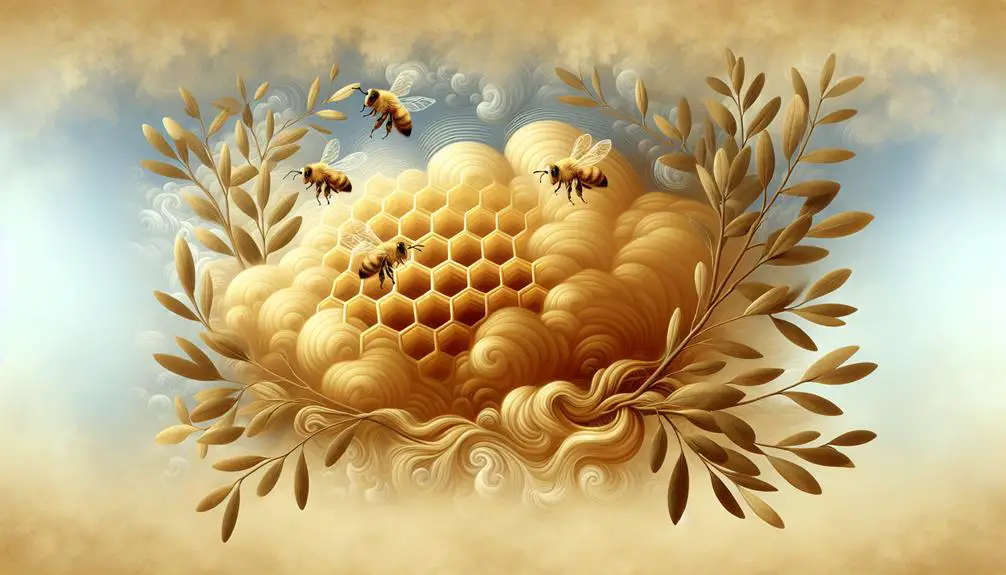
Meaning of Bees in the Bible
It's no secret that the Bible mentions lions and lambs far more than bees, yet these tiny insects carry a weight of symbolism that's hard to ignore. You might find it amusing that bees buzz their way into biblical texts, symbolizing everything from divine provision to the sting of judgment.
Their mentions might be few, but the layers of meaning behind each reference are rich and multifaceted, touching on aspects such as community, diligence, and wisdom. Exploring these symbols offers you a unique lens through which to view ancient texts and their relevance today.
So, why not join in this exploration to uncover what these buzzing creatures reveal about the bigger picture?
Key Takeaways
- Bees symbolize diligence, community, and the divine order, reflecting lessons on unity and collective progress.
- Their role in ecosystems underscores the importance of environmental stewardship and divine provision through nature.
- The symbolism of honey and bee stings highlights the balance between abundance and the consequences of actions.
- Bees embody wisdom and the pursuit of spiritual sweetness, emphasizing the value of knowledge and insight shared within a community.
Symbolism of Honey
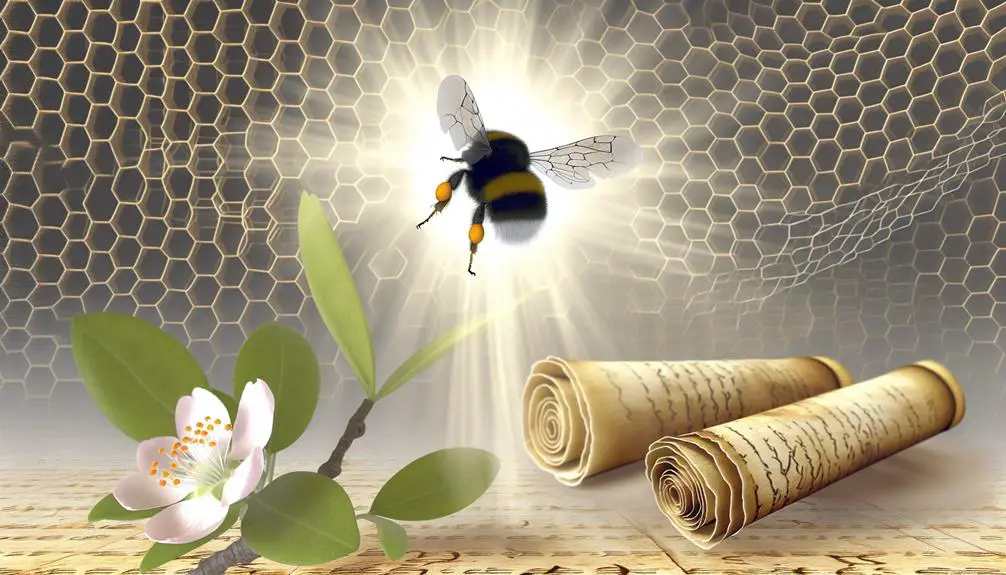
In biblical texts, honey often symbolizes abundance and prosperity, reflecting its esteemed value in ancient societies. This sweet substance not only represented physical nourishment but also held deeper metaphorical meanings. The enduring qualities of honey, immune to spoilage through natural preservation, mirror the timeless and incorruptible words of divine wisdom found in scripture. This aspect of honey preservation underscores a parallel between the physical sustenance it provides and the spiritual nourishment derived from sacred texts.
Moreover, the sweetness symbolism of honey extends beyond mere taste to encompass the joys and rewards of a life aligned with spiritual teachings. Just as honey delights the senses, adhering to spiritual principles offers profound satisfaction and fulfillment. This comparison invites reflection on the pursuit of what's truly enriching and lasting, suggesting that the pursuit of spiritual wisdom is as essential for the soul as honey is for the body.
Thus, the biblical representation of honey weaves together themes of abundance, preservation, and the pursuit of enduring sweetness, offering a rich tapestry of symbolism that resonates with the human quest for meaning and fulfillment.
Bees and Diligence
You encounter numerous instances in the Bible where bees symbolize diligence, a highly regarded virtue in scripture.
Proverbs, in particular, highlights the hardworking nature of bees, encouraging you to emulate their industriousness.
This reflection on bees' diligence not only enriches your understanding of biblical teachings but also challenges you to incorporate this virtue into your daily life.
Proverbs' Hardworking Bees
Reflecting on Proverbs, we observe that bees epitomize diligence and industriousness, serving as a profound metaphor for hard work and perseverance in one's endeavors. Their relentless labor and efficient roles within the hive structure highlight a biblical call to industriousness.
- Bee Communication: Bees' sophisticated methods of communication, including the waggle dance, symbolize the importance of sharing knowledge and working collectively towards common goals.
- Hive Structure: The intricate hierarchy and division of labor within a bee colony reflect an organized approach to tasks and responsibilities, emphasizing the value of each individual's contribution.
- Industrious Nature: Bees' continuous foraging and pollination efforts demonstrate a tireless work ethic, inspiring us to approach our tasks with similar zeal and dedication.
Diligence: A Biblical Virtue
Bees' embodiment of diligence in the Bible mirrors a broader scriptural emphasis on this virtue as essential to a faithful and productive life. You'll find that the Bible doesn't just celebrate bees for their sweetness or sting but elevates their work ethic as a divine call to humans.
This isn't mere symbolism; it's a directive. You're urged to observe bees' productive habits, their relentless pursuit of tasks, and their communal efforts. This isn't just about hard work; it's a reflection on purpose, on contributing to something greater than oneself.
The scriptural narrative encourages you to adopt a similar diligence, suggesting that such an approach isn't merely beneficial but sanctified. It's clear, then, that your work ethic is more than a personal trait; it's a spiritual exercise, a form of worship.
Lessons in Community
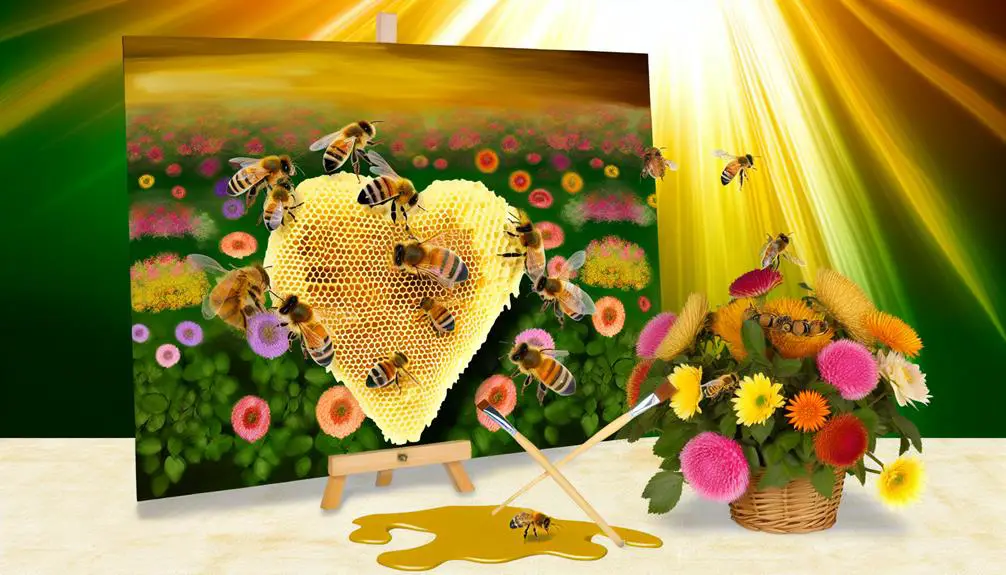
In examining the biblical portrayal of bees, it becomes evident that these creatures offer profound lessons on the importance of community. The intricate hive dynamics and specialized worker roles within a bee colony reflect a well-structured society where each member plays a critical part in its survival and prosperity. This mirrors the biblical call for humans to live in harmony, each contributing their unique gifts for the common good.
Here are three key lessons you can draw from this:
- Shared Purpose: Just as bees work collectively for the well-being of their hive, you're encouraged to pursue a communal goal, uplifting one another in faith and action.
- Diverse Roles, One Body: The diversity in worker roles within a hive underlines the importance of recognizing and valuing different talents and functions within your community.
- Interdependence: Bees depend on each other to survive and thrive. This teaches you the value of mutual support, reminding you that no one is an island and that you're stronger together.
Reflecting on these lessons offers you a deeper understanding of the biblical emphasis on community, urging you to foster unity, embrace diversity, and cultivate interdependence in your relationships.
The Sting of Judgment
You'll find that the bee's sting serves as a poignant biblical metaphor for divine judgment, underscoring the consequences of straying from the righteous path. This metaphor isn't just a relic of ancient texts; it resonates profoundly with contemporary concerns, especially when considering allergic reactions and environmental impact. Allergic reactions to bee stings can be severe, sometimes fatal, acting as a stark reminder of the fragility of human life and the importance of harmony with nature. This parallels the biblical message that actions against divine will can lead to dire consequences, urging a return to a path of righteousness.
Moreover, the environmental impact of bees extends far beyond their sting. Bees play a crucial role in pollination, affecting the entire ecosystem. Their decline due to human activity serves as a broader metaphor for divine judgment, highlighting the consequences of humanity's stewardship of the earth. Just as a bee's sting can provoke an immediate and painful reaction, so too can ignoring environmental responsibilities result in long-term suffering.
Reflecting on the bee's sting within a biblical context encourages a deeper contemplation of one's actions and their impacts, both spiritually and environmentally, echoing the biblical call to mindful, righteous living.
Prophetic Representations
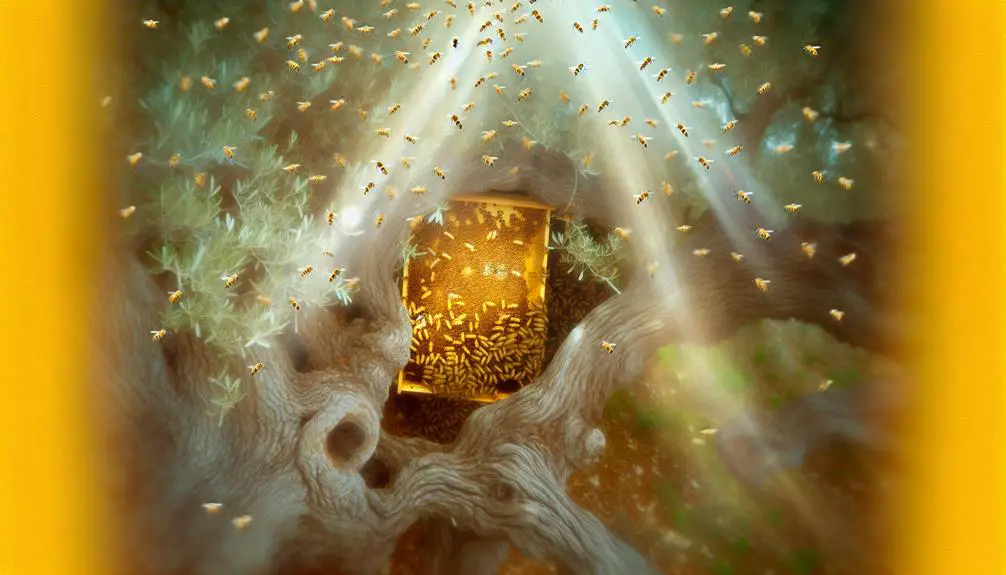
Shifting focus to the realm of prophecy, bees also embody significant symbolic meanings that reflect on divine messages and future events as depicted in biblical narratives. This dimension offers a rich tapestry for understanding how these creatures are intertwined with the prophetic and the apocalyptic. Let's delve into the specific roles they play:
- Bee divination: Historically, bee behaviors were observed for omens or divine signs, suggesting a deep-rooted belief in their connection to the supernatural realm. This practice, while not explicitly biblical, hints at the broader cultural context in which the Bible was written, where bees' actions could be seen as portents of things to come.
- Apocalyptic bees: In apocalyptic literature, bees can symbolize both destruction and renewal. Their capacity for organized labor and productivity, juxtaposed with their potential for aggression, mirrors the dual nature of apocalyptic visions—wherein the end of one world heralds the birth of another.
- Prophetic imagery: Bees, with their intricate societal structures and tireless work ethic, also serve as metaphors for divine order and providence, reflecting the meticulous care with which God oversees the universe and guides its inhabitants towards a predetermined destiny.
Through these representations, bees in the Bible offer a unique lens through which to view the prophetic and the apocalyptic, enriching our understanding of these complex theological concepts.
Connection to Wilderness
You'll find that bees in the Bible aren't merely insects, but profound symbols of the wilderness itself. They serve as a bridge between the desolation of the wild and the sustenance it unexpectedly offers, particularly to prophets who've found solace and provision in these barren landscapes.
This connection underscores a deeper, often overlooked, spiritual nourishment found in the wilderness, facilitated by the presence of bees.
Bees: Symbol of Wilderness
Why do bees emerge as a potent symbol of wilderness in biblical texts? Their representation goes beyond mere insects; they embody the untamed, flourishing life of the wilderness. At the heart of this symbolism lies:
- Bee mythology: Ancient scripts often depict bees as messengers between the divine and the natural, highlighting their role in maintaining the balance of ecosystems.
- Pollination significance: Bees are crucial for the pollination of many wild plants, underscoring their role in sustaining the biodiversity of wilderness areas.
- Adaptability and resilience: Their ability to thrive in diverse environments symbolizes the wilderness's capacity to adapt and flourish despite challenges.
Through this lens, bees don't just symbolize wilderness; they're integral to its very essence, reminding us of the complex interdependence between all living things.
Wilderness Nourishment Source
As we explore the role of bees in the wilderness, it's also crucial to understand how the wilderness serves as a vital source of nourishment, intricately connected to the survival and prosperity of these creatures. The wilderness, teeming with diverse flora, provides bees with an essential platform for their sustenance and the production of honey, a substance renowned for its health benefits.
Aspect |
Significance |
|---|---|
Honey Health |
Enhances immune system, natural healer |
Floral Significance |
Source of nourishment, promotes biodiversity |
This interdependence highlights the wilderness not just as a backdrop for bees' existence but as a critical component of their lifecycle, emphasizing the ecological balance. The health benefits of honey and the significance of flora underline the wilderness's role in nurturing these vital creatures, reinforcing the biblical portrayal of bees as symbols of providence and sustenance.
Prophets' Connection With Bees
In the biblical context, prophets often exhibit a profound connection with bees, symbolizing their deep ties to the wilderness and its divine implications. This relationship isn't merely incidental but is deeply woven into the fabric of their spiritual and physical sustenance. Reflecting on this connection allows us to appreciate several aspects:
- Beekeeping practices – Ancient beekeeping reflects a harmonious relationship with nature, emphasizing the prophets' respect and stewardship for God's creation.
- Swarm symbolism – Bees in swarms represent community, order, and diligence, traits that prophets embodied and taught.
- Divine sustenance – Honey, a product of bees, is often mentioned as a symbol of divine providence, supporting prophets in their mission.
Understanding these elements deepens our appreciation of the symbiotic relationship between prophets and the wilderness, mediated through bees.
Divine Provision and Bees
Bees symbolize divine provision in the Bible, reflecting God's ability to sustain His people in unexpected ways. This motif isn't merely incidental; it's deeply woven into the narrative fabric, illustrating how God's provisions can emerge from the most unanticipated sources. Through pollination allegories, bees are emblematic of how interconnected systems, ordained by divine wisdom, nurture the world. It's a subtle reminder that sustenance often comes through the diligent work and natural processes God has established, not always through direct, miraculous interventions.
Swarm intelligence, a concept mirrored in the behavior of bees, further underscores this theme. Just as bees collectively work, making decisions for the greater good of their hive, this intelligence reflects the biblical principle that God's provision often comes through community and collective efforts. It's a divine orchestration where each part plays a role in sustaining the whole, encouraging a reflection on how human communities might mirror this divine provision through cooperation and mutual support.
In analyzing these aspects, it's clear that bees serve as a profound biblical metaphor for God's provision, emphasizing His creativity and the unexpected ways He sustains His creation.
Wisdom and Insight
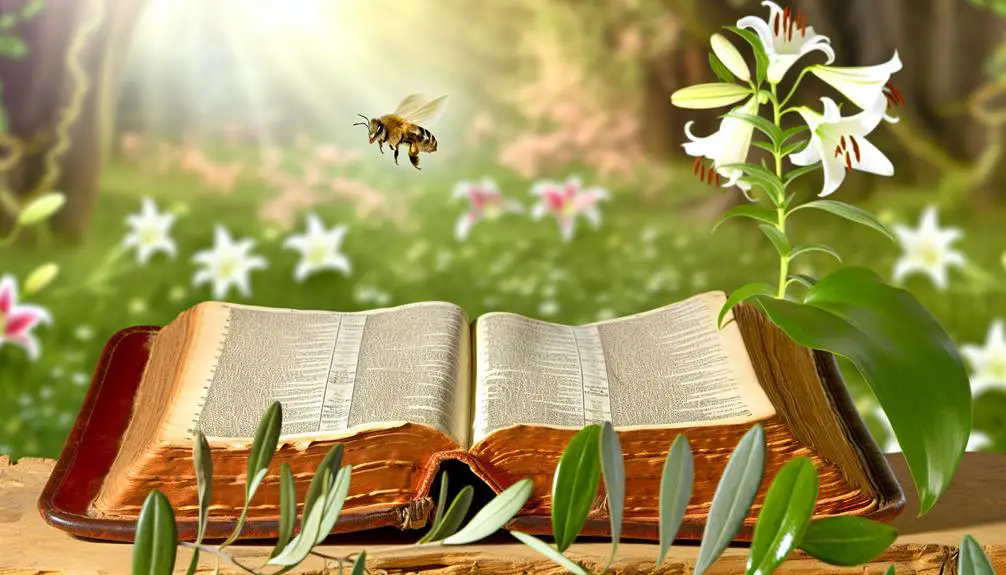
Exploring further, the symbolism of bees extends to embody wisdom and insight, reflecting the profound understanding and discernment that can guide individuals and communities. The hive mentality of bees, where each member works in harmony for the greater good, serves as a metaphor for human societies striving for collective wisdom and progress.
Here are three ways bee metaphors enrich our understanding of wisdom and insight:
- Collective Work: Just as bees collectively work to build their hive and support the queen, you're reminded that wisdom often comes from collaborative efforts and shared experiences. The insightful swarms represent the pooling of knowledge to solve complex problems.
- Navigation and Communication: Bees communicate through dances to share the location of food sources. This symbolizes how wisdom isn't just about possessing knowledge, but also about effectively sharing it with others to guide them towards beneficial outcomes.
- Adaptation and Survival: The ability of bees to adapt to different environments and challenges symbolizes the importance of flexibility and learning in gaining insight. It teaches you that wisdom isn't static but evolves with experiences and changing contexts.
In this light, bee metaphors in biblical texts and beyond serve as a rich source of reflection on the nature of wisdom and the processes through which insightful swarms—communities or societies—can achieve greater understanding and make informed decisions.
Bees in Ancient Rituals
Delving into the realm of ancient rituals, you'll discover that honey and bees played pivotal roles in ceremonies and religious practices, reflecting their deep-seated symbolic significance across various cultures. Bee domestication, a practice that dates back millennia, wasn't merely for the purpose of harnessing honey and wax but was deeply intertwined with the spiritual and ritualistic fabric of societies. The ritual significance of bees and honey was profound, symbolizing themes such as rebirth, wisdom, and purity.
In examining the ritualistic use of bees and honey, you're delving into a world where the natural and the divine intersect. These substances weren't only offerings to deities but also key components in rites of passage, healing ceremonies, and divination practices. The meticulous care in beekeeping highlights the reverence ancient peoples held for bees, viewing them as sacred messengers between the mortal and divine realms.
Reflecting on this, you realize that the ritual use of bees and honey was a testament to their enduring legacy across civilizations. Their role in ancient rituals underscores a universal recognition of their value far beyond their material benefits, embedding them deeply in the spiritual tapestry of human history.
Modern Reflections on Biblical Bees
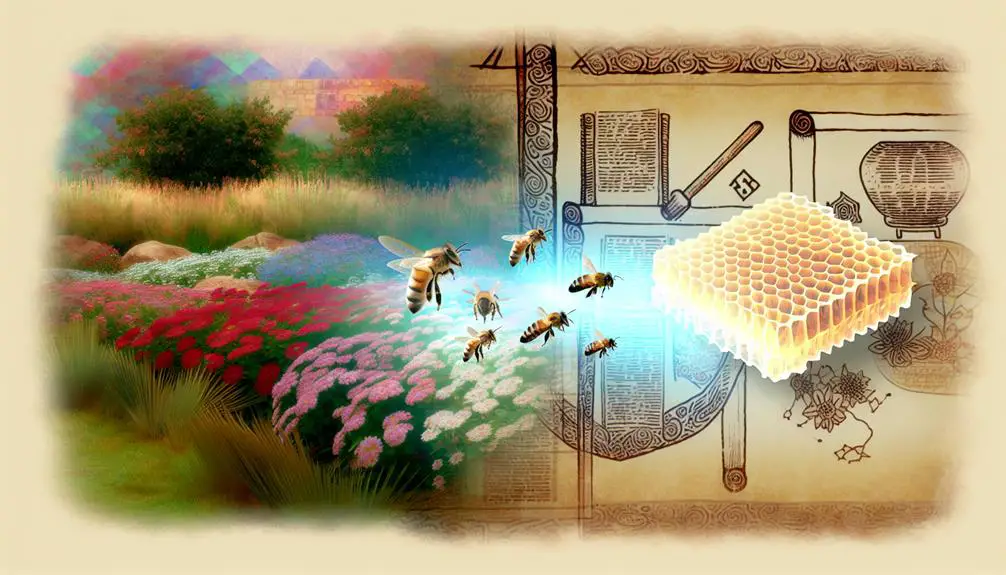
In the modern era, scholars and theologians alike have revisited the biblical significance of bees, uncovering layers of meaning that resonate with contemporary spiritual and ecological concerns. This re-examination has illuminated how bees, as presented in scripture, can serve as potent symbols for modern audiences.
- Environmental Stewardship: The biblical portrayal of bees, thriving in environments from deserts to lush gardens, underscores the importance of caring for God's creation. This perspective encourages a commitment to environmental stewardship, recognizing bees' crucial role in maintaining biodiversity and the health of ecosystems.
- Community and Cooperation: Apicultural metaphors drawn from the Bible highlight the value of community and mutual support. Just as bees work together for the well-being of the hive, humans are called to live in harmony, supporting one another in pursuit of common goals.
- Diligence and Productivity: The industrious nature of bees serves as a model for diligence in one's spiritual and worldly endeavors. Their tireless work ethic, as reflected in biblical texts, inspires individuals to approach their tasks with dedication and to contribute positively to their communities.
Frequently Asked Questions
How Does the Depiction of Bees in the Bible Align With or Differ From Other Ancient Civilizations' Views on Bees?
You're exploring how ancient civilizations viewed bees compared to biblical depictions. While ancient beekeeping and the medicinal uses of honey are well-documented across cultures, the Bible presents bees uniquely, intertwining spiritual symbolism with their natural roles.
This contrasts with other ancient views that primarily focused on practical benefits like honey's healing properties. Your analysis reveals a nuanced understanding of bees, blending their earthly importance with deeper, spiritual meanings.
Are There Specific Biblical Characters Who Are Directly Associated With Bees or Honey, Outside of the Well-Known Stories?
In your exploration of biblical narratives, you'll uncover that beyond the famed tales, certain characters are indeed intertwined with the essence of bees or honey, though not always spotlighted.
Delving into scripture, you'll find these connections not as direct mentions but as subtle nods to bee blessings and hive miracles, enriching the tapestry of biblical stories.
This reflective journey into scripture reveals a nuanced layer of divine symbolism, often overlooked.
How Have Interpretations of Bees' Symbolism in the Bible Evolved From Ancient Times to Contemporary Christianity?
You're exploring how perceptions of bees' symbolism have shifted over time. Ancient interpretations often highlighted their industrious nature and the sweetness of their honey, reflecting themes of diligence and divine providence.
In contemporary Christianity, this symbolism has deepened, incorporating themes of community and stewardship. Reflecting on these changes shows a rich evolution in understanding, where once straightforward symbols now embody more nuanced spiritual and communal values.
In What Ways Have Bees Been Used as Metaphors in Christian Literature and Art That Are Not Directly Derived From Biblical Texts?
In Christian literature and art, bees have often been used as rich metaphors and apicultural allegories, extending beyond direct biblical references.
You'll find honey metaphors symbolizing sweetness and divine wisdom, while the hive's structure reflects ecclesiastical order and community harmony.
These symbols are woven into texts and visuals, encouraging a deep, reflective analysis of faith and morality.
Their use highlights bees' universal appeal and the layered meanings they can convey.
Can the Biblical References to Bees and Honey Inform Modern Environmental Stewardship or the Way We View Bee Conservation Today?
In today's world, where bee populations face threats, biblical references to bees and honey can inspire a renewed commitment to environmental stewardship. By understanding the ancient respect for bees, you're reminded of their crucial role in biodiversity.
Reflecting on bee genetics and modern apiculture within this context, you're called to integrate traditional wisdom with contemporary conservation efforts. This approach not only supports bee survival but also honors a heritage of reverence towards these vital pollinators.
Conclusion
In your exploration of bees in the Bible, you've unearthed a profound coincidence: these tiny creatures embody vast, divine concepts. Bees, with their diligence and communal living, aren't just happenstance examples; they're meticulously chosen symbols of wisdom, judgment, and provision.
Your journey through scripture reveals that, far from being mere insects, bees serve as divine messengers, teaching us about hard work, community, and the sweet rewards of following divine wisdom.
This reflective analysis underscores the intricate ways the natural world mirrors spiritual truths.



Sign up